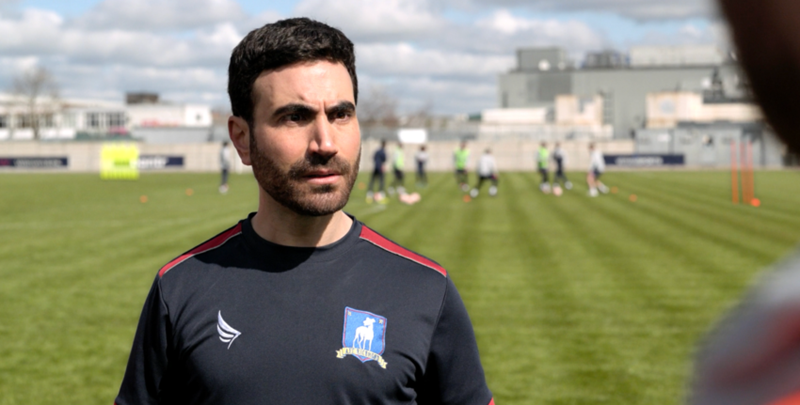Soccer has long been known as a sport that offers therapy for those who may be hesitant to seek traditional counseling. For many, kicking a ball around a field can provide a release of pent-up emotions and stress, allowing individuals to process their feelings in a more physical and visceral way. This is especially true for those who may struggle with expressing their emotions verbally or sitting in a therapist’s office.
The physicality of soccer allows for a different type of communication, where emotions can be worked through and understood without the need for words. It can also provide a sense of community and camaraderie, as individuals come together to play the game they love and support each other both on and off the field. In many ways, soccer can serve as a form of therapy that is just as effective, if not more so, than traditional counseling for those who may have difficulty with more conventional forms of therapy. It offers a safe space for individuals to work through their emotions, connect with others, and find solace in the game they love.

Soccer as Emotional Release: Insights from Real-Life Roy Kent
Soccer has long been known as a powerful emotional release for many individuals, providing a cathartic outlet for stress, anger, and frustration. This therapeutic aspect of the sport has been exemplified by the character of Roy Kent in the popular television series «Ted Lasso.» As a former professional soccer player turned coach, Roy embodies the emotional highs and lows that come with the game. Throughout the series, viewers witness Roy’s struggles with managing his anger and emotions, both on and off the field. However, it is through his love for the game that Roy finds solace and a sense of purpose. Soccer becomes his escape, a place where he can channel his emotions and find release from the pressures of everyday life.
Through Roy Kent’s journey, viewers gain insights into the transformative power of soccer as an emotional outlet. The sport provides a sense of camaraderie, belonging, and a way to channel one’s emotions in a healthy manner. Whether it be through the thrill of competition, the joy of scoring a goal, or the support of teammates, soccer offers a unique opportunity for individuals to express themselves and find release from their inner turmoil. For Roy Kent, the soccer field becomes a sanctuary where he can let go of his pent-up emotions and find a sense of peace amidst the chaos of his life.
In conclusion, soccer serves as a powerful emotional release for many individuals, allowing them to find solace, purpose, and connection through the beautiful game. Through the character of Roy Kent in «Ted Lasso,» viewers are reminded of the therapeutic benefits of soccer and the importance of finding healthy outlets for managing emotions. Ultimately, soccer provides a space for individuals to express themselves, connect with others, and find release from the stresses of everyday life.
Roy Kent’s Real-Life Perspective: Soccer as a Substitute for Therapy
Roy Kent, the beloved character from the hit TV show «Ted Lasso,» has become a fan favorite for his gruff exterior and no-nonsense attitude. However, beneath his tough exterior lies a complex individual who uses soccer as a form of therapy. Throughout the series, it becomes clear that soccer is more than just a game to Roy – it is a way for him to cope with his emotions and find some semblance of peace in his chaotic life. In many ways, soccer serves as a substitute for traditional therapy for Roy, allowing him to release pent-up frustration and anger on the field rather than bottling it up inside.
The physicality and intensity of the sport provide an outlet for Roy to channel his emotions in a healthy way, allowing him to work through his issues in a constructive manner. Additionally, the camaraderie and support of his teammates offer Roy a sense of belonging and purpose, helping him to feel less alone in his struggles. Overall, soccer serves as a powerful tool for Roy to navigate the ups and downs of life, providing him with a sense of control and stability in an otherwise tumultuous world. Through his journey, Roy demonstrates the transformative power of sports as a form of therapy, showing that sometimes the best way to heal is through the beautiful game of soccer.

The Therapeutic Benefits of Soccer: Lessons from Real-Life Roy Kent
Soccer, like many other sports, has incredible therapeutic benefits that can positively impact both physical and mental well-being. Real-life Roy Kent, a character from the popular TV show «Ted Lasso,» exemplifies how soccer can be a form of therapy for individuals dealing with personal struggles. Through his journey, we see how the game helps him navigate through his anger, insecurities, and past traumas. Soccer serves as a form of release for Roy, allowing him to channel his emotions and find a sense of purpose on the field.
The physical activity involved in playing soccer also contributes to improved overall health and well-being. The camaraderie and teamwork fostered through the sport provide a sense of belonging and support system for individuals like Roy, who may be struggling with personal challenges. Additionally, the structure and discipline required in soccer can help individuals develop important life skills such as time management, goal-setting, and resilience.
Overall, soccer can serve as a powerful tool for personal growth and healing, offering a therapeutic outlet for individuals to work through their emotions and find a sense of peace and fulfillment. Just like Roy Kent, many people can benefit from the therapeutic power of soccer, using the game as a way to cope with life’s challenges and ultimately find strength and resilience in the process.

Beyond the Field: Roy Kent Shows How Soccer Acts as Therapy for the Therapy-Averse
Roy Kent, the beloved character from the hit TV show «Ted Lasso,» has shown audiences the power of soccer as a form of therapy for those who may be resistant to traditional therapy methods. Kent, a former professional soccer player turned coach, struggles with anger management and has a tough exterior that masks his vulnerability. Throughout the series, we see how playing and coaching soccer serves as a therapeutic outlet for Kent, allowing him to work through his emotions and connect with others on a deeper level. Soccer provides Kent with a sense of purpose, structure, and camaraderie that he may not have found in other forms of therapy.
The physical activity and teamwork involved in soccer help Kent release pent-up emotions and build healthy coping mechanisms. Additionally, the support and understanding he receives from his teammates and coach create a sense of community and belonging that is essential for his emotional well-being. By showcasing Kent’s journey, «Ted Lasso» highlights the transformative power of sports in promoting mental health and well-being.
Kent’s story serves as a reminder that therapy comes in many forms, and for some, kicking a ball around a field may be just as therapeutic as sitting in a therapist’s office. Soccer has the ability to break down barriers and provide a safe space for individuals to express themselves, heal, and grow. As Kent demonstrates, sometimes the best therapy is found beyond the confines of traditional methods, and the soccer field can be a powerful place for personal growth and healing.
